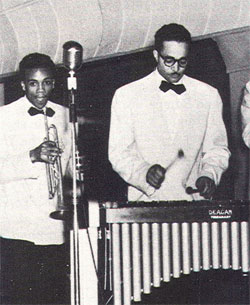Robert “Bumps” Blackwell was a musician, producer, and composer who worked with the top names in early jazz and rock and roll. Blackwell was born in Seattle, Washington on May 23, 1918. By the late 1940s his Seattle-based “Bumps Blackwell Junior Band” featured Ray Charles and Quincy Jones, and played with artists like Billie Holiday, Cab Calloway, and Billy Eckstine. He moved to Los Angeles, California in the early 1950s and hired on with Art Rupe’s Specialty Records.
In 1955, Blackwell flew to New Orleans, Louisiana to record Little Richard (Richard Penniman), a singer who they hoped would become the next Nat King Cole. During a break in the tepid recording session everybody headed to a nearby bar where Mr. Penniman started banging out an obscene club song on the piano. “Daddy Bumps” knew he had a hit so he brought in a local songwriter to clean up the lyrics. “Tutti-Frutti, good booty” became “Tutti Frutti, all rootie,” and Little Richard became a star. Bumps wrote or co-wrote other early rock hits including “Good Golly Miss Molly,” “Long Tall Sally,” and “Rip It Up.”
Blackwell produced the hit “You Send Me” against Rupe’s wishes. Rupe feared Sam Cooke‘s crossover from gospel to pop would hurt the sales of his gospel records. Rupe fired Bumps who then took Cooke and his recording cross town to Keen Records where it became the first #1 hit by a solo black artist. He went on to garner 17 Gold Records while producing a variety of artists including Sly Stone, Lou Rawls, the Fifth Dimension, the Chambers Brothers, The Blind Boys of Alabama, the Coasters, Ike and Tina Turner and Bob Dylan.
Blackwell taught his artists the business side of music, “because I don’t want my pupils to be unprepared like I was, like [Little] Richard was, like we all were.” The Blackwell International Academy of the Performing Arts was opened after his death in 1985.

